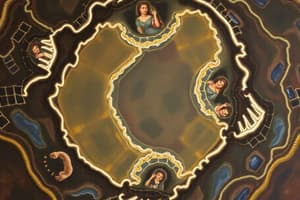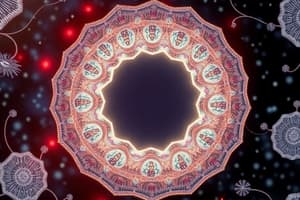Podcast
Questions and Answers
What are the two major phases of the cell cycle?
What are the two major phases of the cell cycle?
- Cytokinesis and Interphase
- G1 phase and S phase
- M phase and G phase
- Interphase and M phase (correct)
DNA replication occurs continuously throughout interphase.
DNA replication occurs continuously throughout interphase.
False (B)
What does the S phase of interphase correspond to?
What does the S phase of interphase correspond to?
DNA synthesis
The division of interphase is made up of G1, S, and G2 phases, with ___ phase being where DNA synthesis occurs.
The division of interphase is made up of G1, S, and G2 phases, with ___ phase being where DNA synthesis occurs.
Match the following events with their descriptions:
Match the following events with their descriptions:
What experimental technique was used to observe DNA replication in the study?
What experimental technique was used to observe DNA replication in the study?
HeLa cells were used in the experiment to determine the timing of DNA synthesis.
HeLa cells were used in the experiment to determine the timing of DNA synthesis.
Who proposed the division of interphase into three separate phases?
Who proposed the division of interphase into three separate phases?
What promotes the formation of prereplication complexes at the origins of replication during early G1 phase?
What promotes the formation of prereplication complexes at the origins of replication during early G1 phase?
Cdk4 and Cdk6 are associated with A-type cyclins during mid-G1 phase.
Cdk4 and Cdk6 are associated with A-type cyclins during mid-G1 phase.
What is the name of the regulatory protein whose phosphorylation promotes the transition from G1 to S phase?
What is the name of the regulatory protein whose phosphorylation promotes the transition from G1 to S phase?
The transition from G2 to M phase is driven by cyclin ______-Cdk1 and cyclin ______-Cdk1 complexes.
The transition from G2 to M phase is driven by cyclin ______-Cdk1 and cyclin ______-Cdk1 complexes.
Which complex is primarily responsible for initiating DNA replication?
Which complex is primarily responsible for initiating DNA replication?
During prophase, chromosomes become less compact to facilitate segregation during mitosis.
During prophase, chromosomes become less compact to facilitate segregation during mitosis.
What molecules help facilitate chromosome compaction during early prophase?
What molecules help facilitate chromosome compaction during early prophase?
Match the following cell cycle phases with their main characteristics:
Match the following cell cycle phases with their main characteristics:
What is the function of chromosomal microtubules during anaphase?
What is the function of chromosomal microtubules during anaphase?
Polar microtubules slide past one another and help separate the poles during anaphase.
Polar microtubules slide past one another and help separate the poles during anaphase.
What protein complex is associated with unattached kinetochores and is critical for the spindle assembly checkpoint?
What protein complex is associated with unattached kinetochores and is critical for the spindle assembly checkpoint?
The force required for chromosome movement during anaphase is provided by the release of strain energy during the depolymerization of ______.
The force required for chromosome movement during anaphase is provided by the release of strain energy during the depolymerization of ______.
Match the following components with their primary roles:
Match the following components with their primary roles:
What happens to tubulin subunits during anaphase A?
What happens to tubulin subunits during anaphase A?
The Ndc80 protein complex functions by encircling the plus end of microtubules in animal cells.
The Ndc80 protein complex functions by encircling the plus end of microtubules in animal cells.
What is the key difference between the coupling mechanisms in yeast and animal cells?
What is the key difference between the coupling mechanisms in yeast and animal cells?
What prevents the cell from continuing on into anaphase?
What prevents the cell from continuing on into anaphase?
Mad2 molecules promote cell cycle progression by interacting with Cdc20.
Mad2 molecules promote cell cycle progression by interacting with Cdc20.
What is the role of Aurora B kinase at the kinetochores?
What is the role of Aurora B kinase at the kinetochores?
During telophase, the nuclear envelope __________.
During telophase, the nuclear envelope __________.
Which type of attachments can Aurora B kinase correct?
Which type of attachments can Aurora B kinase correct?
Match the following phases of cell division with their descriptions:
Match the following phases of cell division with their descriptions:
Cytokinesis is proposed to generate force through a contractile ring made of myosin.
Cytokinesis is proposed to generate force through a contractile ring made of myosin.
What is the primary mechanism by which separase allows sister chromatids to be pulled apart?
What is the primary mechanism by which separase allows sister chromatids to be pulled apart?
What do the microtubules of the phragmoplast serve as during cytokinesis in plant cells?
What do the microtubules of the phragmoplast serve as during cytokinesis in plant cells?
The newly formed cell plate contributes to the growth of the cytoskeleton.
The newly formed cell plate contributes to the growth of the cytoskeleton.
What is the role of secretory vesicles during the formation of the cell plate?
What is the role of secretory vesicles during the formation of the cell plate?
During G1, the two centrioles of the pair separate by a few _____ micrometers.
During G1, the two centrioles of the pair separate by a few _____ micrometers.
Match the following components with their respective descriptions:
Match the following components with their respective descriptions:
What material is added to the cell plate after its completion to form the mature cell wall?
What material is added to the cell plate after its completion to form the mature cell wall?
Centrioles replicate during the M phase of the cell cycle.
Centrioles replicate during the M phase of the cell cycle.
What happens to the tubular network built from vesicles during cytokinesis?
What happens to the tubular network built from vesicles during cytokinesis?
Flashcards are hidden until you start studying
Study Notes
The Cell Cycle
- The cell cycle has two major phases: M phase (mitosis and cytokinesis) and interphase (G1, S, and G2).
- Interphase is the phase where the cell grows, replicates its DNA, and prepares for cell division.
- S phase is the period of DNA synthesis.
- DNA replication occurs during a defined period of the cell cycle.
- Cdk (cyclin-dependent kinase) activity regulates the cell cycle.
- Cyclins are proteins that activate Cdks.
- The G1-S transition is driven by the activity of cyclin E-Cdk2 and cyclin A-Cdk2 complexes.
- The G2-M transition is driven by the activity of cyclin A-Cdk1 and cyclin B1-Cdk1 complexes.
M Phase: Mitosis and Cytokinesis
- Prophase: chromosomes condense into compact structures, the mitotic spindle forms, and the nuclear envelope breaks down.
- Prometaphase: chromosomes attach to the mitotic spindle via kinetochores.
- Metaphase: chromosomes align at the metaphase plate (the center of the cell).
- Anaphase: sister chromatids separate and move to opposite poles.
- Telophase: chromosomes decondense, the nuclear envelope reforms, and the mitotic spindle disappears.
- Cytokinesis: cytoplasm divides, forming two daughter cells.
Prophase
- The conversion of interphase chromatin into compact chromosomes occurs during early prophase.
- Condensins help in chromosome compaction.
- Cohesins hold sister chromatids together.
Mitotic Spindle
- Chromosomal microtubules extend between the centrosome and kinetochores.
- Polar microtubules extend from the centrosome past the chromosomes.
Anaphase
- Anaphase A: shortening of chromosomal fibers and movement of chromosomes towards the poles.
- Anaphase B: elongation of the spindle and separation of the poles.
- The Dam1 ring (in budding yeast) or the Ndc80 protein complex (in animal cells) encircle the plus end of the microtubule at the kinetochore.
Spindle Assembly Checkpoint
- The spindle assembly checkpoint ensures all chromosomes are properly aligned at the metaphase plate before anaphase begins.
- Unattached kinetochores contain Mad2, a protein that mediates the checkpoint.
- Aurora B kinase helps correct abnormal microtubule connections.
Cytokinesis
- In animal cells, cytokinesis involves the formation of a contractile ring made of actin filaments.
- Myosin contracts the ring, forming a furrow that divides the cell.
- In plant cells, a cell plate forms between the daughter cells.
Plant Cell Cytokinesis
- Phragmoplast, formed from remnants of the mitotic spindle, serves as tracks for Golgi-derived vesicles.
- The vesicles fuse to form a tubular network, which eventually becomes the cell plate.
- The cell plate matures into a continuous partition, forming the cell wall.
Microtubule-Dependent Motor Proteins
- Four major classes of microtubule-dependent motor proteins contribute to spindle assembly and function.
Centrosome Duplication
- Centrosome duplication occurs during G1 and S phases.
- A daughter centriole grows near the base of each mother centriole.
Studying That Suits You
Use AI to generate personalized quizzes and flashcards to suit your learning preferences.





